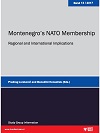Montenegro’s NATO Membership - Regional and International Implications
33rd Workshop of the PfP Consortium Study Group "Regional Stability in South East Europe”
Dokumenttyp:
Study Group InformationErscheinungsdatum:
September 2017Herausgeber:
Dr. Predrag Jureković, Mag. Benedikt HensellekVerlag:
Study Group Information - Austrian National Defence Academy in co-operation with the PfP Consortium of Defense Academies and Security Studies InstitutesISBN:
978-3-903121-25-6Seiten:
142Autor(en):
Robert Bariæ, Selmo Cikotiæ, Blagoje Gledović, Mag. Benedikt Hensellek, Oleg Ivanov, Dr. Predrag Jureković, Craig Nation, Dr. Lulzim Peci, Vlade Raduloviæ, Nano Ruzhin, Dr. Arian StarovaBeiträge in dieser Publikation:
Vorwort
Soon after regaining its independence on May 21 2006, Montenegro decided to take the Euro-Atlantic integration path. The country’s recent NATO membership could aid further European integration in the future. The current publication of the 33rd RSSEE SG workshop presents chances and impediments connected to Montenegro’s accession to NATO and explains related impacts for Montenegro in particular, and for the whole region in general. Power constellations and geopolitical trends that affect security developments in the Western Balkans are analysed from a national and international point of view.



